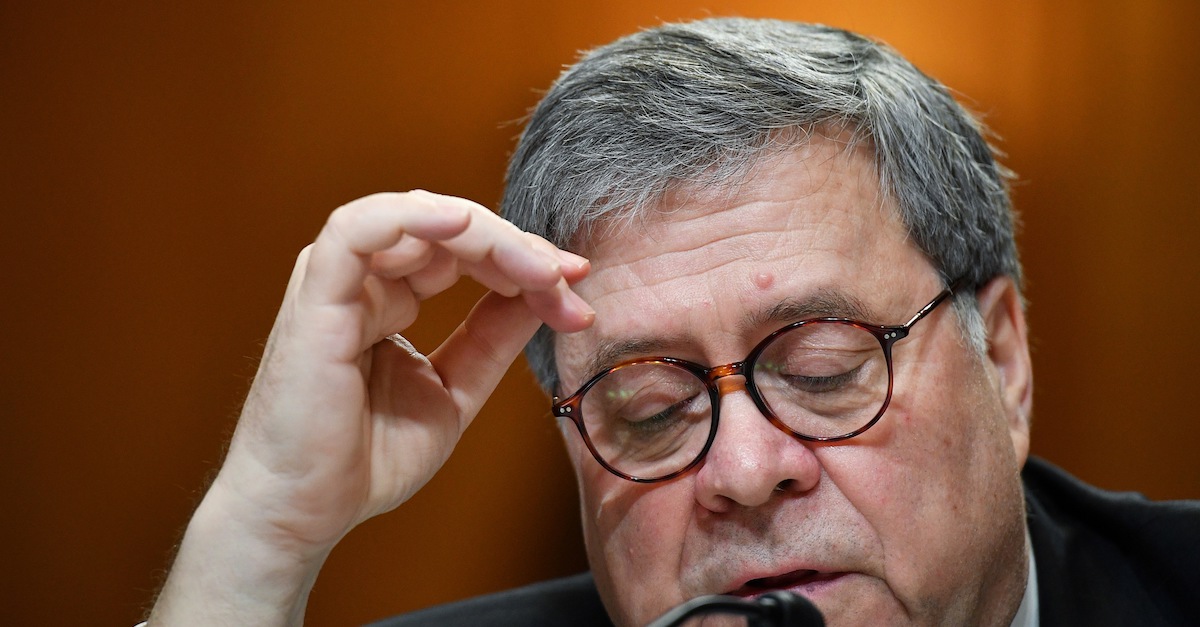
US Attorney General William Barr testifies during a US House Commerce, Justice, Science, and Related Agencies Subcommittee hearing on the Department of Justice Budget Request for Fiscal Year 2020, on Capitol Hill in Washington, DC, April 10, 2019.
The Department of Justice must produce a memo cited by then-attorney general Bill Barr as his justification for not charging then-president Donald Trump with obstruction of justice following the release of the Mueller report, a federal judge ruled on Monday.
After special counsel Robert Mueller released his findings in March 2019, Barr purported to “summarize the principal conclusions” in a letter to congressional leaders that condensed the nearly 400-page report into just over three pages, which did not include a single completed sentence from the report.
“[Barr’s] characterization of what he’d hardly had time to skim, much less, study closely, prompted an immediate reaction, as politicians and pundits took to their microphones and Twitter feeds to decry what they feared was an attempt to hide the ball,” U.S. District Judge Amy Berman Jackson wrote in a scathing 41-page order.
The nonprofit government watchdog Citizens for Responsibility and Ethics in Washington (CREW) “immediately fired off” a Freedom of Information Act (FOIA) request for any records related to Barr’s considerations but the DOJ “demurred on the grounds of the deliberative process and attorney-client privileges,” the court noted.
After that initial denial, CREW sued, alleging wrongful withholding of various records not subject to FOIA exemptions. After years of legal wrangling, the group “accepted the bulk of” the DOJ’s efforts to withhold various pieces of information, the court notes, except for Document 6 and Document 15. The court ruled that DOJ was correct to withhold Document 6 under a relevant FOIA exception–but that the agency must provide CREW with Document 15.
Jackson’s opinion offers a detailed description of the document by way of the DOJ’s Office of Legal Counsel (OLC) [emphasis in original]:
As indicated in the portions of the memorandum that were released, it was submitted to the Attorney General to assist him in determining whether the facts set forth in Volume II of Special Counsel Mueller’s report “would support initiating or declining the prosecution of the President for obstruction of justice under the Principles of Federal Prosecution.” The released portions also indicate that the memorandum contains the authors’ recommendation in favor of a conclusion that “the evidence developed by the Special Counsel’s investigation is not sufficient to establish that the President committed an obstruction-of-justice offense.” The withheld portions of the memorandum contain legal advice and prosecutorial deliberations in support of that recommendation. Following receipt of the memorandum, the Attorney General announced his decision publicly in a letter to the House and Senate Judiciary Committees…
DOJ argued that Document 15 is “predecisional” and therefore subject to a specific exemption from the federal transparency law.
Judge Jackson, however, disagreed “because the materials in the record, including the memorandum itself, contradict the [DOJ’s] assertions that the decision-making process they have identified was in fact underway” and “the record supplies reason to question whether the communication preceded any decision that was made.”
CREW argued, on the other hand, that Mueller “already had made final prosecutorial judgments, and the time for [Barr] to challenge those judgments had passed.”
“The absence of a pending decision for [Barr] to make necessarily means the memo did not make a recommendation or express an opinion on a legitimate legal or policy matter,” one of CREW’s court filings said. “Instead, it was part of a larger campaign initiated by Attorney General Barr to undermine the Special Counsel’s report and rehabilitate the President.”
The court generally agreed with CREW regarding Document 15.
Jackson, without describing the contents of the document itself, explains that one of the sections of the memo “offers strategic, as opposed to legal advice, about whether [Barr] should take a particular course of action, and it made recommendations with respect to that determination.”
That first section, the court noted, is essential for understanding the “proper context” of the second section, in which the Justice Department discusses whether Mueller’s evidence “would amount to obstruction of justice.”
“Moreover, the redacted portions of Section I reveal that both the authors and the recipient of the memorandum had a shared understanding concerning whether prosecuting [Trump] was a matter to be considered at all,” Jackson continues. “In other words, the review of the document reveals that the Attorney General was not then engaged in making a decision about whether the President should be charged with obstruction of justice; the fact that he would not be prosecuted was a given.”
The upshot of the memo, the court determined, “calls into question the accuracy of Attorney General Barr’s March 24 representation to Congress.” The judge also noted that the Justice Department’s prior description of the memo “served to obscure the true purpose of the memorandum.”
Jackson determined that her secret “in camera review of the document, which DOJ strongly resisted, raises serious questions about how the Department of Justice could make this series of representations to a court.”
Jackson went on to note that “while CREW had never laid eyes on the document, its summary was considerably more accurate than the one” given by the Justice Department to the court.
“What remains at issue today is a memorandum to the Attorney General dated March 24, 2019, that specifically addresses the subject matter of the letter transmitted to Congress,” the order notes. “It is time for the public to see that, too.”
The Justice Department has two weeks to respond to the court’s order.
[Image via Mandel Ngan/AFP/Getty Images]